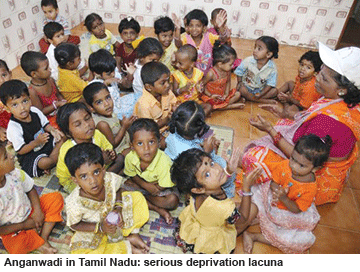No products in the cart.
Place ECCE Squarely on Education Agenda
The newly inducted Modi sarkar urgently needs to take the NECCE policy draft approved by the UPA-II government forward.  Thanks to a small minority of educators and educationists including pioneers who braving opprobrium, promoted metropolitan preschools several decades ago, the Mumbai-based Early Childhood Association (ECA, estb. 2010) and not least EducationWorld, which has convened four global ECCE (early childhood care and education) conferences during the past four years, the critical importance of early years (1-5) education has dawned upon India’s backward education establishment and the Union HRD ministry in Delhi.
Thanks to a small minority of educators and educationists including pioneers who braving opprobrium, promoted metropolitan preschools several decades ago, the Mumbai-based Early Childhood Association (ECA, estb. 2010) and not least EducationWorld, which has convened four global ECCE (early childhood care and education) conferences during the past four years, the critical importance of early years (1-5) education has dawned upon India’s backward education establishment and the Union HRD ministry in Delhi.
On September 20 last year, the Union cabinet of the Congress-led UPA-II government approved a National Early Childhood Care and Education (NECCE) policy drafted by the ministry of women and child development (WCD). NECCE recommends the transformation of all 1.6 million anganwadis — early motherhood and child nutrition centres funded by the Central government under its Integrated Child Development Services (ICDS) programme started in 1975 — into ECCE centres, and prescribes infrastructure, quality and other benchmarks for the country’s estimated 300,000 private preschools. However, with the Congress-led UPA II coalition roundly trounced in the general election two months ago, the NECCE policy draft has vanished from the radar of the new BJP-led NDA coalition government sworn into office on May 26.
Quite clearly, the national interest demands that the NECCE policy draft is resurrected, processed and amplified because, of the country’s 158 million children aged below six, only 75.7 million i.e. 48 percent are covered under the ICDS’ anganwadis programme, which under the WCD policy draft will also provide early childhood education. Given that only 10 million 0-6 age group children are provided ECCE by the country’s estimated 300,000 private sector preschools and NGOs, the vast majority of India’s infants are denied professionally administered early childhood education.
This is a serious lacuna with grave implications for India’s future because it’s now well established by numerous neuroscience research studies that children’s brains are almost 90 percent developed by the time they attain the age of eight. According to economics Nobel laureate Prof. James Heckman, the return on investment to society of a dollar invested in ECCE is higher than equal investment in K-12 and tertiary education (and also the US stock market) because it reduces juvenile delinquency and criminal activity while increasing the prospects of improved scores in standardised tests and productive, high-income careers.
Swati Popat Vats, a sociology, law and education alumna of Bombay University, president of the 167 strong Podar Jumbo Kids network of owned and franchised preschools countrywide, and founder-president of ECA which has a registered membership of 970 preschools, is a determined champion of professionally administered ECCE for all of India’s children in the 0-5 age bracket. “Children go through a period of rapid learning in the first five years. The most embedded parts of our personality — attitudes, moral values, emotional tendencies, learning abilities, how we deal with people and situations — are determined by experiences that we have had between the ages 0-5. That’s when all human beings learn to adapt and respond to the world. In April this year, 16 neuroscientists specialising in nutrition, chemistry and child development discussed and debated the influence of early years education on brain development at the Unicef (United Nations Children’s Fund) offices in New York.
Three messages were delivered to Unicef from this meeting. One of them was that ‘early intervention is the answer: it becomes progressively harder to fix problems’. Or as the New York Times editorial put it, it makes more sense to invest in preschools than prisons,” says Popat Vats.
Therefore the ECA chaired by Popat Vats has drawn up a detailed route map for the new BJP-led NDA government at the Centre to revive and put some teeth into the NECCE policy draft of the WCD (see box). Moreover, ECA has written a comprehensive eight-page open letter based upon a comparative study of ECCE policies and practices in 39 countries to prime minister Narendra Modi, calling upon him to appoint a separate ministry for early childhood development, care and education (www.eca-india.org).
“The Union cabinet approved draft policy document is a vision document which needs to be detailed. In the new globalised world of the 21st century, we don’t need to reinvent the wheel and should draw upon the successful experiences of countries around the world. The ECCE policy of Singapore’s ministry of education and of the UK are useful reference points. They have enacted ECCE policies which encompass demo models, qualifications, training, curriculum, registration and regulation,” says Popat Vats.
Will the newly-inducted Modi sarkar take the cabinet approved WCD policy draft on ECCE forward and/or act upon the impassioned ECA plea? Given that the Modi sarkar’s first initiative in education is to infiltrate Hindu mythology and culture into history and social sciences textbooks, the signs are not good.
| ECA guidelines for NECCE • Establish model ECCE centres in every state. ECA will help to design and establish these centres |














Add comment